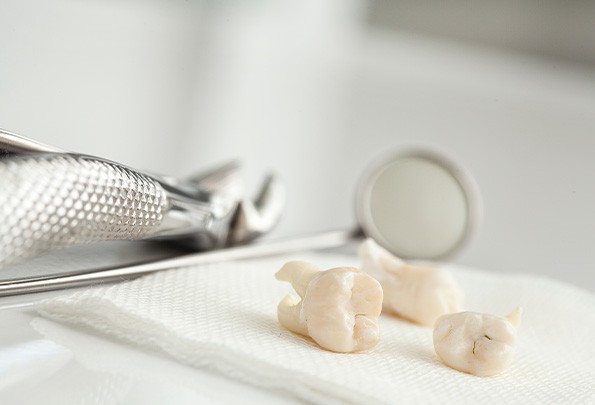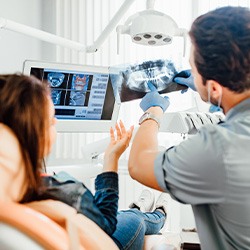Tooth Extractions – Everett, WA
Sometimes Removing a Tooth Is the Best Option

A primary goal in dentistry is to preserve your natural teeth since you only get one set, after all. However, there are circumstances of decay or disease where the best move for your oral health is to have one or more of your teeth extracted. At Albright Family Dental, Dr. Kaopua is qualified to keep you comfortable during the process, as he offers oral conscious sedation or nitrous oxide. Sometimes removing a tooth is the best option. To learn more about tooth extractions in Everett, continue reading or contact our office for an appointment!
Why Are Tooth Extractions Necessary?

A tooth extraction will only be considered after all other options have been explored. Our goal will always be to repair your damaged tooth with a dental crown or root canal therapy. But there will be emergency dentistry situations where tooth extractions are recommended, such as:
- Severe tooth decay
- Severe gum disease
- An impacted tooth – most commonly involves wisdom teeth
- Overcrowding – can make oral care more difficult, cause bite problems, or set the stage for impaction
- Fractured tooth
- Tooth luxation – injury to the tissues, ligaments, or bone supporting your tooth
If Dr. Kaopua recommends a tooth extraction, it is important to take action, so you do not risk more severe complications in the future.
The Process of Removing a Tooth

Your dentist in Everett will assess your affected tooth and surrounding gums, plus take dental X-rays. You will have the option to choose between nitrous oxide or oral conscious sedation to keep you comfortable. Next, local anesthesia will be given to numb the tooth and surrounding gum tissue.
Using specialized instruments, your dentist will gently loosen your tooth and lift it from the socket. If your tooth is badly decayed or has broken off at the gumline, it may be necessary to make incisions in the gums to access it. Once removal is complete, the socket is cleaned and disinfected. Stitches may be placed to promote healing.
Tooth Extraction Aftercare

After the extraction procedure, you will receive post-op instructions to help you recover with minimal discomfort. To ensure your mouth heals properly, be mindful of these aftercare tips:
- Drink plenty of water and get some rest to promote healing
- Use a cold compress on the outside of your mouth to manage pain and swelling
- Do not drink out of a straw
- Avoid hard, crunchy foods for the first few days
- Eat soft foods like rice, pasta, eggs, yogurt, and applesauce
- Take prescribed antibiotics and pain medications to alleviate discomfort
- Brush and floss carefully around the surgical site to keep it clean
- After 24 hours, rinse with warm salt water to disinfect the site
- Avoid strenuous activity for at least two days
Understanding the Cost of Tooth Extractions

The cost of tooth extractions can vary from case to case and depends on multiple factors, so we cannot provide any firm numbers until after we have a chance to evaluate your unique situation. In most instances, this procedure is relatively affordable. Plus, it provides excellent value because it can set you up for many years of improved oral health! Continue reading below to learn more about the financial side of tooth extractions.
Tooth Extraction FAQs
Does Getting a Tooth Extracted Hurt?
Many patients are hesitant to commit to all sorts of treatments because they are worried that the treatment will be painful. The good news is that whether you are having a single tooth pulled or all of your teeth, the first step is always numbing your mouth with a local anesthetic. We also offer sedation options to make your experience even more comfortable. You will likely experience some soreness after your treatment, but by closely following your aftercare instructions, you can make your recovery as quick and comfortable as possible.
Can I Leave the Space Empty After a Tooth Extraction?
If your tooth that needs to be pulled is located in the back of your mouth, you may think that you don’t need to have it replaced. After all – no one can see it! The truth is that your teeth do a lot more than just make your smile look great. They are essential to chewing properly and enunciating clearly. Even a single missing back tooth can make it difficult to chew, leading to poor nutrition and indigestion. Depending on the reasoning behind your extraction, it is a good idea to discuss tooth replacement options with your dentist to find one that works best for you.
How Long After a Tooth Extraction Can I Get Dentures?
On average, it takes about six to eight weeks to get your dentures. Once you have completely healed, your dentist will make impressions of your mouth to design your prosthetic. During this time, they will also take note of the ideal size, shape, and shade of your replacement teeth. After your dentures are made, your dentist will have you try them on and make any final adjustments for optimal comfort.
How Should I Prepare for My Tooth Extraction?
Preparing for your tooth extraction is just as important as following your aftercare instructions. Before your procedure, ask your dentist any questions you have. If they have any specific instructions, like sticking to water in the morning or picking up a prescription ahead of time, you should do so before your treatment. If you are being sedated, you should arrange for a trusted friend or family member to drive you to and from your procedure.



